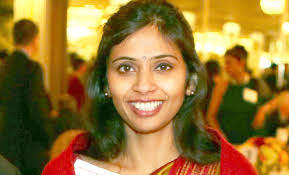
"We have seen the judgement related to the indictment of January 9. It is good as far as it goes," spokesperson in the Ministry of External Affairs said.
He said the lawyers will meet to "examine it carefully before we are able to respond substantially and in more detail".
Khobragade, who was India's deputy consul-general in New York, was arrested on December 12 outside her children's school.
She has won dismissal of the indictment against her for visa fraud, with a US judge ruling she had full diplomatic immunity.
However, prosecutors are not barred from bringing new charges in future.
Reacting to the US court verdict, her father Uttam Khobragade said, "They tried to trap Devyani with a false complaint against her. I thank the Indian government and the Indians for their cooperation and help. She will go back to America with full diplomatic immunity".
US District Judge Shira Scheindlin said in her 14-page order that "it is undisputed" that Khobragade acquired full diplomatic immunity at 5:47 pm on January 8 after the US State Department approved her accreditation as a counselor to India's mission to the United Nations.
While the indictment was returned on January 9, Khobragade had the immunity till she departed from the US for India on the evening of January 9 and so the prosecutors cannot proceed with the current indictment.
"Khobragade's motion to dismiss the indictment on the ground of diplomatic immunity is granted. Khobragade's conditions of bail are terminated, and her bond is exonerated. It is ordered that any open arrest warrants based on this indictment must be vacated," Scheindlin said in her 14-page order, capping months of unprecedented diplomatic tensions between the US and India.
"On January 9, immediately following the return of the indictment, Khobragade appeared before the court through counsel and moved to dismiss the case. Because the court lacked jurisdiction over her at that time, and at the time the indictment was returned, the motion must be granted," the judge said ordering that the motion and the case be closed.
US Attorney Preet Bharara's office had argued that Khobragade, 39, was not immune from her December 12 arrest on charges of visa fraud and making false statements about the visa application of her domestic help Sangeeta Richard.
Khobragade's arrest on visa fraud charges had triggered a row between the two countries with India retaliating by downgrading privileges of certain category of US diplomats among other steps.
Earlier
US judge throws out charges against Devyani Khobragade
New York, Mar 13: An Indian diplomat whose arrest and strip search spurred an international flap had charges against her dismissed by a federal judge on Wednesday.

But the ruling left open the possibility prosecutors could bring a new indictment against her, and they "intend to proceed accordingly," said James Margolin, a spokesman for Manhattan US attorney Preet Bharara.
Khobragade's attorney, Daniel Arshack, praised the ruling. "The judge did what the law required, and that is: that a criminal proceeding against an individual with immunity must be dismissed," Arshack said. "She's (Khobragade's) hugely frustrated by what has occurred. She is heartened that the rule of law prevailed."
After being indicted, she complied with a department of state order to leave the US. The Indian government then asked Washington to withdraw a diplomat from the US embassy in New Delhi. The US complied.
A federal prosecutor ventured into the tense relationship between the US and India in December, defending the arrest and strip search of Khobragade when she was held on visa charges and saying she was treated very well, even given coffee and offered food while detained.
US attorney Preet Bharara said Khobragade was afforded courtesies most Americans wouldn't get — such as being allowed to make phone calls for two hours to arrange child care and sort out personal matters — after she was discretely arrested by US department of state agents outside her children's Manhattan school.
Khobragade was arrested on charges she lied on a visa application about how much she paid her housekeeper, an Indian national. Prosecutors said the maid received less than $3 per hour for her work.
Bharara said Khobragade, who had pleaded not guilty, wasn't handcuffed, restrained or arrested in front of her children. And he said that while she was "fully searched" in private by a female deputy marshal, the move was a standard safety practice all defendants undergo





Comments
Add new comment